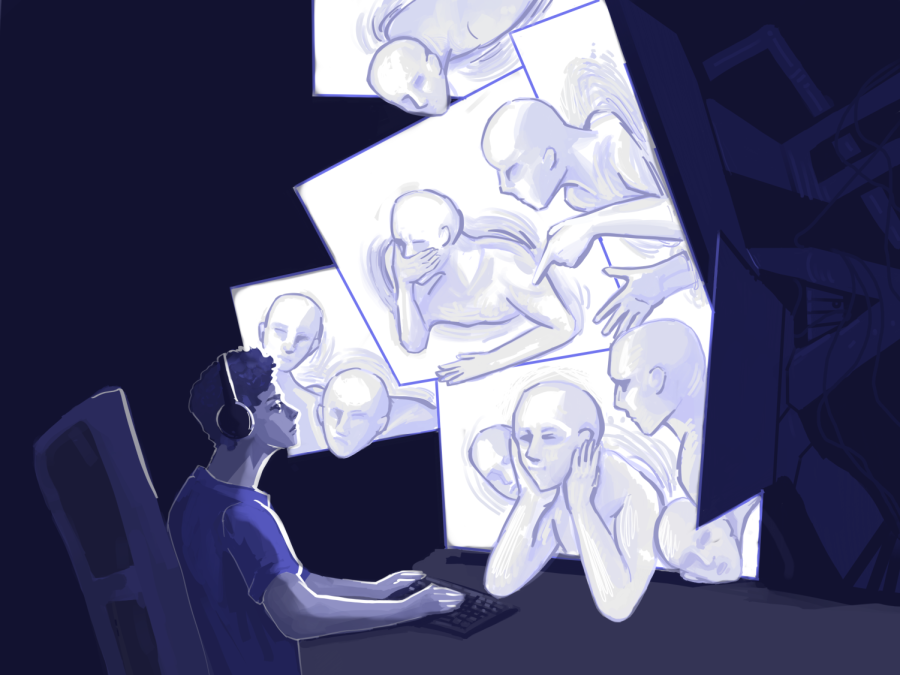Halting the spiral of parasocial relationships
Parasocial relationships can be fulfilling, and involving ourselves with our favorite celebrities and characters is a normal part of our lives. We can admire the people on the screen, aspire to be them and connect with them parasocially.
The bright glaring screen illuminates my drowsy face as I scroll past the umpteenth video and press on a smiling face, ready to launch myself into endless hours of video consumption. Over quarantine, I strung my days together with television shows and movies where I, like many others, filled the void of social interaction with social media. The open access to online entertainment has filled our lives with joy; we’ve also formed unique connections in the form of parasocial relationships with the characters and people projected through the pixels on our screens.
Parasocial relationships, a completely one-sided relationship where one side doesn’t know the other side exists, such as one between a viewer and celebrity, is a shared experience among many, especially during the pandemic. A 2017 study showed that around 61% of all adolescents thought of themselves as having a relationship with their favorite media stars. This number likely increased as our time spent with our electronics increased due to the COVID pandemic. Parasocial connections are a typical reaction to social media, and having these relationships can be beneficial to one’s health as this connection can help inspire and encourage people and help viewers feel less lonely.
As the internet continues to consume our everyday lives, it’s natural to form connections with the people who we can relate to and look up to. These connections come hand in hand with the internet, and we should embrace the benefits that come with our enjoyment of social media. On the other hand, when these relationships begin to spiral into unhealthy obsession, they become damaging to both sides of the relationship. As with any relationship, it is important to define clear boundaries between what is healthy and what veers onto the side of delusion.
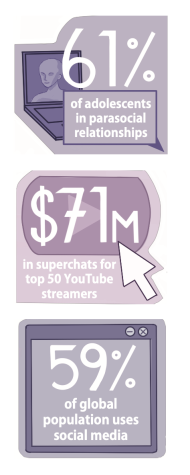
The first and foremost fact that fans forgo is that celebrities are real people with real feelings who are greatly affected by the way that their fan base acts. Celebrities deserve to be treated with basic human decency while interacting with their fans. Through their parasocial connection, consumers of social media often become overly invested with the lives of their favorite online stars, and obsessive fans put huge pressure on celebrities to act and dress in a specific way. A pattern of fans hotly debating personal decisions of celebrities plagues the industry, and it has to change.
After Adele posted a photo of herself on Instagram in 2020, many fans jumped to criticize the singer, noticing that she had lost weight, with some claiming that she was fatphobic. Instead of considering that she has her own reasons and motivations for losing weight, people online quickly jumped to accusations. Adele revealed that she had been working out not for the purpose of losing weight but because exercise helped with her anxiety. She should not be treated differently because she had made a decision for her health and wellbeing, and the same goes for any other person in the spotlight of fame.
Celebrities don’t owe their fans anything, and it’s damaging to expect them to conform perfectly to what fans want. Additionally, it’s understandable to feel a connection towards a favorite star and have the desire to protect them; however, harassment in any form is wrong. Many celebrities have been sent hate because a fan base believed they had insulted their favorite celebrity. Some fans are merely overanalyzing the situation and it’s important to make a clear distinction between calling a celebrity out for immoral behavior and petty hatefulness.
Moreover, although some stars might voluntarily showcase a large part of their lives online, they still deserve privacy and control over their own lives. Fans may feel entitled to certain things from a celebrity because of their parasocial connection; however, this is not an invitation to harass them or to overstep their boundaries.
Twitch, a gaming platform that blew up over the pandemic, hosts many of the most popular streamers who have extremely loyal fanbases. In August of 2022, a viewer called the Los Angeles Police Department on streamers Ludwig and QTCinderella during a livestream in an act dubbed as swatting. Swatting refers to when police or other safety personnel are called under the pretense of a false crime. The streamers had been a target of the so-called pranks multiple times before. During an interview with Anthony Padilla, QTCinderella revealed that after the terrifying incidents, she was diagnosed with post-traumatic stress disorder (PTSD).
Ludwig and QTCinderella’s situations are prime examples of how fans disregarding the boundaries of the celebrity can greatly impact the mental health of the people they’ve developed a parasocial relationship with. Celebrities don’t know the people on the other side of the screen and cannot be expected to treat fans as if they do. Ludwig and QTCinderella are not the only streamers or online personas that have been harassed in this manner, and this behavior of fans is greatly problematic. It’s easy to think about how gratifying it would be to meet your favorite celebrity or to interact with them in various ways, but audiences need to realize that they are not the only people affected by their own actions.
As part of the fan base for popular Twitch streamers Sykkuno and Jacksepticeye, I’ve spent many hours watching their content, and I’ve been able to find solace in them. Along with being able to watch their streams and videos, I’ve also come to enjoy interacting with other fans who enjoy watching the same people that I do. However, seeing fans pressuring the streamers and overstepping their boundaries has been very off-putting to me. Although most fans would never go to these extremes, it’s important for fans to reflect on their own behavior. Viewers need to remember that although we might have a connection to them, celebrities do not know who we are, and they can be affected by the way we act. Taking time to be mindful of our actions will benefit both us as fans and our favorite stars.
Parasocial relationships can be fulfilling, and involving ourselves with our favorite celebrities and characters is a normal part of our lives. We can admire the people on the screen, aspire to be them and connect with them parasocially. However, at the end of the day, they are people, and they deserve our utmost respect.
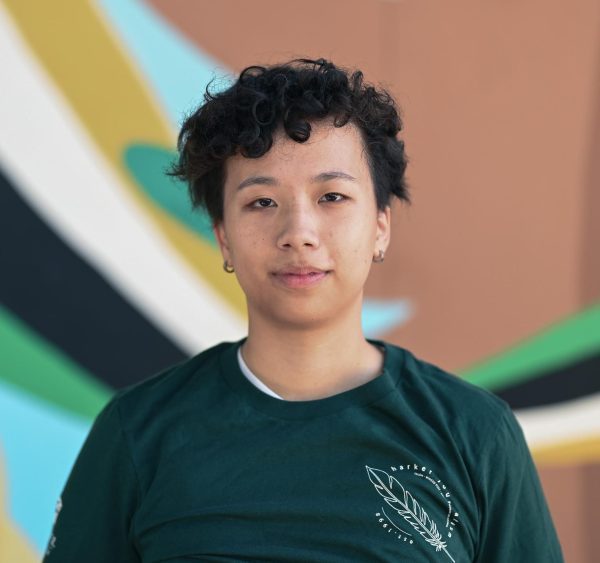
Yifan Li (12) is an Editor-in-Chief of the TALON Yearbook, and this is her fourth year on staff. This year, she hopes to further explore creative and unique...
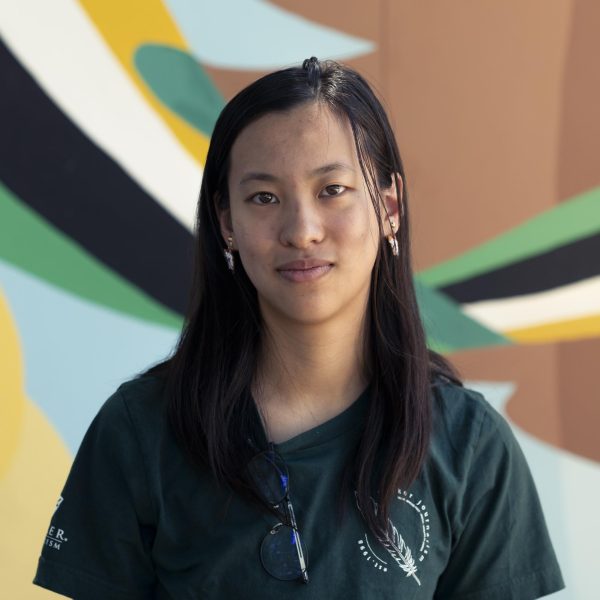
Mirabelle Feng (12) is a Student Life editor for the TALON Yearbook, and this is her fourth year on staff. This year, she looks forward to creating unique...
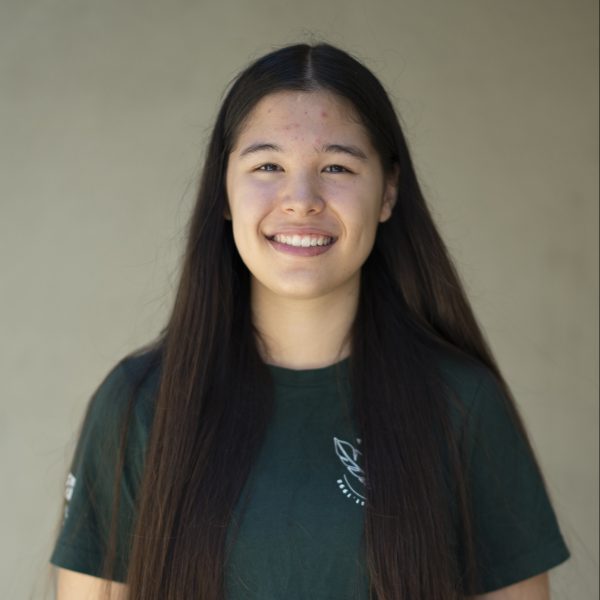
Margaret Cartee 12) is a co-managing editor for Harker Aquila, and this is her fourth year on staff. This year, Margaret wants to do more illustrations...


















![“[Building nerf blasters] became this outlet of creativity for me that hasn't been matched by anything else. The process [of] making a build complete to your desire is such a painstakingly difficult process, but I've had to learn from [the skills needed from] soldering to proper painting. There's so many different options for everything, if you think about it, it exists. The best part is [that] if it doesn't exist, you can build it yourself," Ishaan Parate said.](https://harkeraquila.com/wp-content/uploads/2022/08/DSC_8149-900x604.jpg)




![“When I came into high school, I was ready to be a follower. But DECA was a game changer for me. It helped me overcome my fear of public speaking, and it's played such a major role in who I've become today. To be able to successfully lead a chapter of 150 students, an officer team and be one of the upperclassmen I once really admired is something I'm [really] proud of,” Anvitha Tummala ('21) said.](https://harkeraquila.com/wp-content/uploads/2021/07/Screen-Shot-2021-07-25-at-9.50.05-AM-900x594.png)







![“I think getting up in the morning and having a sense of purpose [is exciting]. I think without a certain amount of drive, life is kind of obsolete and mundane, and I think having that every single day is what makes each day unique and kind of makes life exciting,” Neymika Jain (12) said.](https://harkeraquila.com/wp-content/uploads/2017/06/Screen-Shot-2017-06-03-at-4.54.16-PM.png)








![“My slogan is ‘slow feet, don’t eat, and I’m hungry.’ You need to run fast to get where you are–you aren't going to get those championships if you aren't fast,” Angel Cervantes (12) said. “I want to do well in school on my tests and in track and win championships for my team. I live by that, [and] I can do that anywhere: in the classroom or on the field.”](https://harkeraquila.com/wp-content/uploads/2018/06/DSC5146-900x601.jpg)
![“[Volleyball has] taught me how to fall correctly, and another thing it taught is that you don’t have to be the best at something to be good at it. If you just hit the ball in a smart way, then it still scores points and you’re good at it. You could be a background player and still make a much bigger impact on the team than you would think,” Anya Gert (’20) said.](https://harkeraquila.com/wp-content/uploads/2020/06/AnnaGert_JinTuan_HoHPhotoEdited-600x900.jpeg)

![“I'm not nearly there yet, but [my confidence has] definitely been getting better since I was pretty shy and timid coming into Harker my freshman year. I know that there's a lot of people that are really confident in what they do, and I really admire them. Everyone's so driven and that has really pushed me to kind of try to find my own place in high school and be more confident,” Alyssa Huang (’20) said.](https://harkeraquila.com/wp-content/uploads/2020/06/AlyssaHuang_EmilyChen_HoHPhoto-900x749.jpeg)



